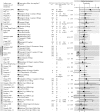Evidence-based clinical practice guidelines for IgA nephropathy 2014
- PMID: 27095365
- PMCID: PMC4956709
- DOI: 10.1007/s10157-015-1223-y
Evidence-based clinical practice guidelines for IgA nephropathy 2014
Figures





Publication types
MeSH terms
LinkOut - more resources
Full Text Sources
Other Literature Sources
Miscellaneous

